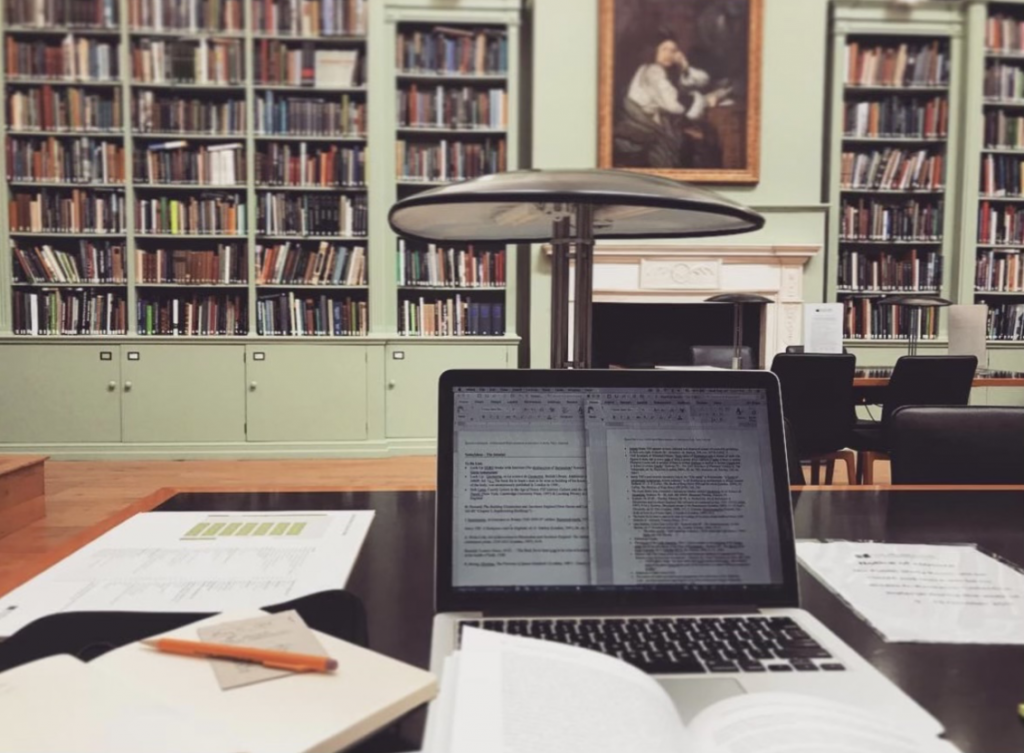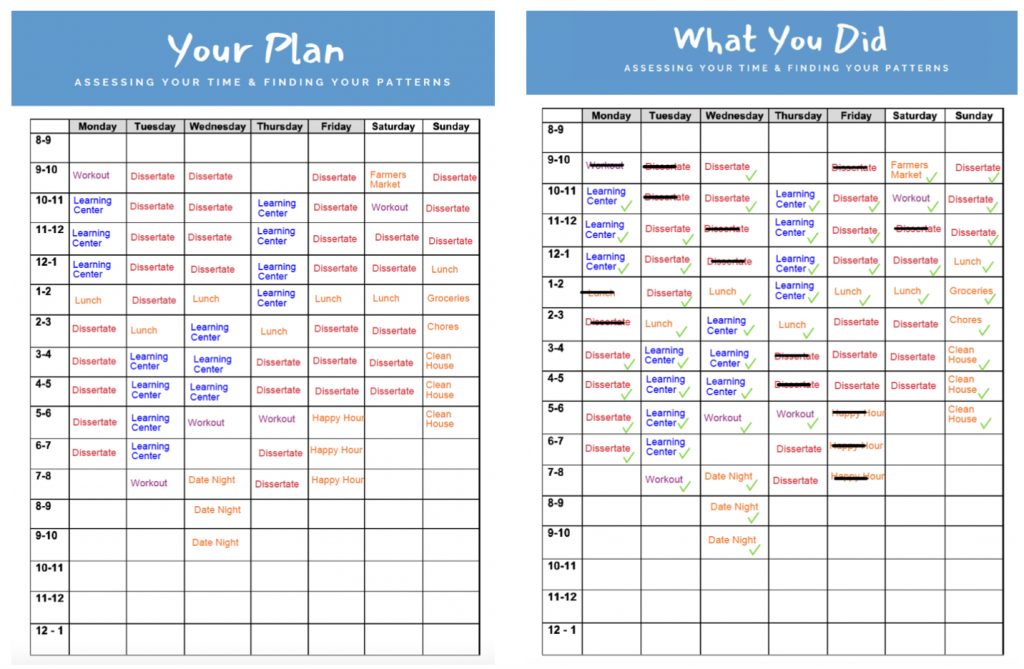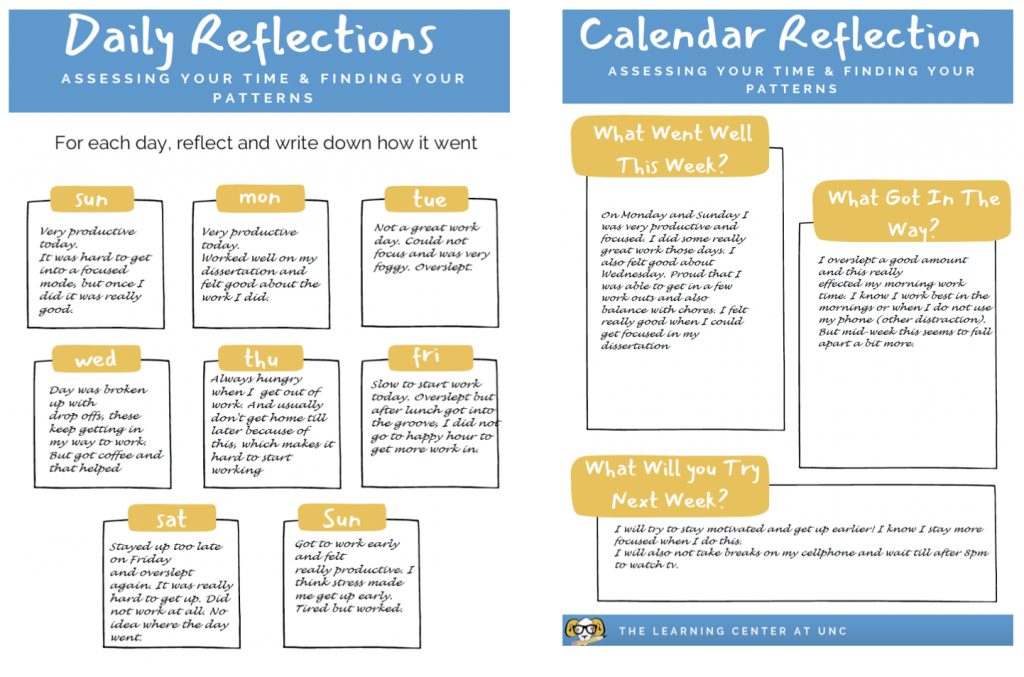Where Did My Time Go? Assessing Your Time & Finding Your Patterns
By Miranda, a Learning Center Coach
Where does my time go? Have you ever thought that? After a busy week and the hustle and bustle, feeling like you have lost time? I know I do all the time. As a busy graduate student who also works, most weeks end with me feeling exhausted and unsure of what I actually got done. I know that I had been busy – sometimes far too busy – and I did at least most of the work I needed to, but I honestly feel like time escapes me. I get that constant feeling that I am overwhelmed but not productive. The words effective and efficient use of time continually evade me.
I tried to reflect on where my time went despite using a calendar. During my first semester as a Ph.D. student, I could not believe how fast the semester went. It felt like I had just started when suddenly it was fall break, and I was rapid-fire writing horrible drafts of my papers due on Monday after we returned (a cruel due date). Then, what felt like a few days later was suddenly Thanksgiving break, and I saw the looming due dates for three term papers that were not nearly ready to turn in. A panic two weeks later ended my first term in a state of pure exhaustion, confusion, and relief at surviving. But what I could not understand was why this happened. I had a calendar I used. I knew the papers were coming. But there was something about how I had organized my time that did not include working on my papers early enough.

To be frank, I honestly thought school was about the fast-paced last-minute finishing of projects. There was a weird pride in pulling those late-night hours to revise a paper. Often in class that day, you would hear a chorus of graduate students saying how many hours they worked previously; an odd mix of “please take pity on me” and “praise me,” we would all note the nine- or twelve-hour days we had pulled over the last week to finish the assignments. In part, this is probably due to the amount of work we graduate students do (and, from what I know, the undergraduates as well). From conferences to publishing papers, course work, and fellowship applications, all alongside completing our own research and working for our funding (often including a copious amount of grading and lesson planning), time disappears quickly.
Recently, after feeling that same old deadline panic and the crunch to finish, I decided to reflect on how I am using my time. It felt like I was always rushing to something, needing to answer some email, and working hard all day. So, I opened my good old calendar. My first observation was how much available time I had! My weekends were open outside of department happy hour regularly held on Fridays. My Mondays were totally free. All the open space and still, where was my time going???
Seeing how much free space I had in my calendar, I instantly overcorrected by adding more to my calendar. No wonder I was writing papers last minute! Look at all the space I had to start early! Immediately I started filling in all gaps: My break from 12-1:30 pm; I can work! Nothing till 2:00 pm on Tuesdays; I could be up at 8:00 am to work! My evenings are open; I can work!
Now, I am not saying that adding time devoted to my studying was a bad idea. In fact, I think we should all plan our study time, set goals for our working hours, and have a clear vision of the kinds of work or studying we do when not in a meeting, class, or work. But that being said, after a week or two of following my new schedule where every minute was full of work, I still felt exhausted and unproductive. Moreover, I followed my new extremely meticulous schedule for a day or two, but then my schedule broke down. I was tired. It turns out working over eight hours a day just because I had a free space in my calendar was not the healthy way to organize my time. I reverted back to time disappearing and feeling disappointed in the whole experiment.
Now, I do not share all this to discourage anyone from trying new ways of organizing your time or just to commiserate about being busy. I share this because often we create a schedule – whether adding too much or too little – that is not ideal. This seems natural to me; this is a goal, a plan, my ideal use of my time. However, I have realized more and more that we rarely can hold up to the ideal all the time. And that is okay.
Based on this, I thought, why don’t I plan out my ideal week but then create a daily check-in to record how I am actually using my time? Think of this as a calendar journal exercise. I would take a week and simply see where my time goes. Then, I could assess my work and study patterns based on comparing my actual calendar to my ideal calendar. Finally, I could find a way to learn from my week and create a more realistic calendar for the next week. For instance, “I always get tired and zone out on my phone – sometimes losing an hour or more. After seeing these pattern I realized my brain needed a minute to relax and recharge. Right after lunch is a good time to get light exercise or treat myself to a coffee – maybe even schedule time to talk with a friend!”
My process was simple. First, I filled out my google calendar with my ideal schedule. I made a point to include my meetings, work hours, social events, or anytime I had to ‘be’ somewhere. I then added my study times, including what I would work on (i.e., work on a job application, revise my dissertation chapter, and such). Finally, I incorporated my own items, things I needed to do (errands, chores, working out, etc.). With a fully filled out week – including breaks – I was ready to try it out…and, more importantly, to reflect on how it went.

Each day I took time to open my google calendar and record what I had done, actually done, with my time that day. I did this by adding notes to my google calendar to see the changes from my original schedule clearly. I would even suggest just using a blank calendar and recording how your week goes. I also noted how I felt (as I tried, stressed, hungry, or happy).
Once the week was up, I took time to look over what I originally planned out compared to where my time actually went. For example, I learned that I do some of my best work if I get up early in the morning. I learned that after dinner, I have a tough time focusing. All of this information came from simply recording how I used my time and how it felt.

Creating a calendar journal can really help show where your time actually goes. I know for myself that allowed me to counter my pitfalls or find healthy work habits. It sounds simple enough. Record what you actually do in a day and then reflect on how it went. But I found it really helped me see where my time goes and how much I really do in a day. It also helped me realize when I work best or when I am typically most tired.
This blog showcases the perspectives of UNC Chapel Hill community members learning and writing online. If you want to talk to a Writing and Learning Center coach about implementing strategies described in the blog, make an appointment with a writing coach, a peer tutor, or an academic coach today. Have an idea for a blog post about how you are learning and writing remotely? Contact us here.

